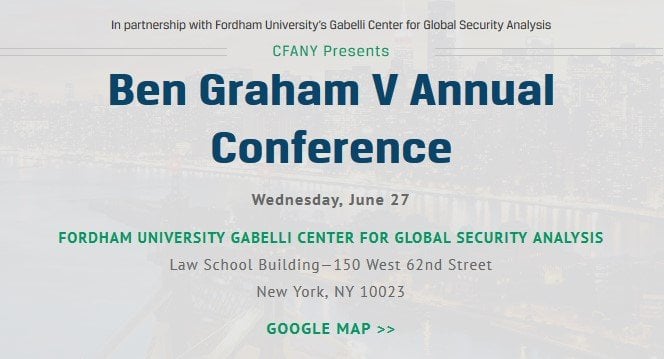Detailed notes of Jeff Jacob, Senior Managing Director, Marathon Asset Management from the NYSSA Ben Graham annual conference which took place on Wednesday, June 27th 2018 in New York stay tuned for much more. Right now we have many pages of notes from the full day conference featuring Rich Pzena, Murray Stahl,Thomas A. Russo, Jason Karp, Christopher C. Davis, Jim Grant and many others.
Q2 hedge fund letters, conference, scoops etc
[00:00:00-00:00:24 miscellaneous] [00:00:24] Male 1: Hi everyone, it’s my pleasure to introduce our final key note Jeff Jacob the senior managing director of Marathon. He does Marathon’s corporate credit business and is a member of the executive committee. He serves as portfolio manager for Marathon in special situation portfolios. He joined Marathon after 8 years with Arch View as credit manager in 2009 where he served as chief investment office and become a managing partner.Prior to managing Arch View he was the founding member and head of Citigroup's global special situations group managing $3.7 billion in assets in North America, Latin America and Europe. He was previously head of Citi Group’s distressed trading group, he served on the fixed income and commodity management committee and the fixed income diversity committee. Prior to that he spent 7 years at Merrill Lynch as head of distressed trading and ran the South East Asia distressed trading business in Hong Kong. Please join me in welcoming Jeff Jacob.
[00:01:26] Jeff: So thanks for having me. I was delighted to be invited here today as a distressed investor you don’t get the chance to talk at conferences very often these days. I was delighted at the invitation, I got the conference material and realised that the theme of the conference was exactly what I do, it’s kind of like giving the eulogy at your funeral.Anyway I’m asked to give a little bit of perspective on finding value in this environment of low rates and perceived low risk from a high yield distressed perspective. I’ve been involved in distressed investing for 25 years now, I started at Merrill Lynch back in the early 90’s. I quickly gravitated to the high yield department and then the newly formed distressed trading business. I was a fundamental credit analyst by the training of background and I was really drawn to the deep fundamental research, intrinsic value aspect, investing in capital structures through the dip at discount, sometimes at pennines on the dollar to add value through that market capital structure.
From my perspective at that time, and I still hold this belief, I really feel like distressed investing is the quintessential value investing strategy. I think a distressing strategy or a distressed strategy is that involved, buying debt and creating and unlocking value through a bankruptcy process using contract law assisted by bankruptcy law. It really actually does incorporate a lot of the critical elements that Ben Graham actually used to describe originally value investing.
Investing in distressed is by definition contrarian. I think that involved investing based on a market of safety using fundamental analysis to find intrinsic value, to use the law to drive a process on that value. Obviously it is a long term strategy, distressed or bankruptcies take years to unfold they don’t happen in weeks, months or quarters.
So you have to be a long term investor but you also have to be able to display a critical element of the Graham got approach to value investing. That’s having the discipline to exercise patience and be able to learn to do nothing when value isn’t evident, and right not value isn’t evident. Distressed right now is really it’s all about being patient.
The opportunity side today in distressed cry is it’s pretty bare. I know [inaudible 00:05:01] markets are in an extremely annoyingly good mood, companies can borrow at relatively low rates and more forgiving terms. The economy is chugging along and interest rates at below 4%. Credit spreads are at post crisis types and there’s really not a lot for distressed investors to do, it’s not really a target rich environment if you will.
I’m actually very optimistic right now, I’m characteristically optimistic because of what’s the market is doing. The high yield market, the high bond market, they’re really extending credit on unprecedented terms. I do believe this will all come home to roost sooner rather than later creating, and not just creating, a lot of raw material for what I do. I think I’m right, I think it’s a lot closer than we all think.
If you look at the commodities you look at the high yield market it’s actually grown considerably, it’s doubled since before the crisis it’s gone from $600 billion to $2.2 trillion. The BBB market has added even more explosive growth, BBB is from about $800 billion to $3 trillion in outstanding amounts. The low risk quality of BBBs is around 500% since the crisis and the ones that I look at are I think are this rating and I think they should be junk. It’s gone from $130 billion to about $800 billion. That if you think about it which is right on the cusp of junk is about two thirds of the more high yield line. So we think about that, we think about the next opportunities for that.
Read the full notes here.






